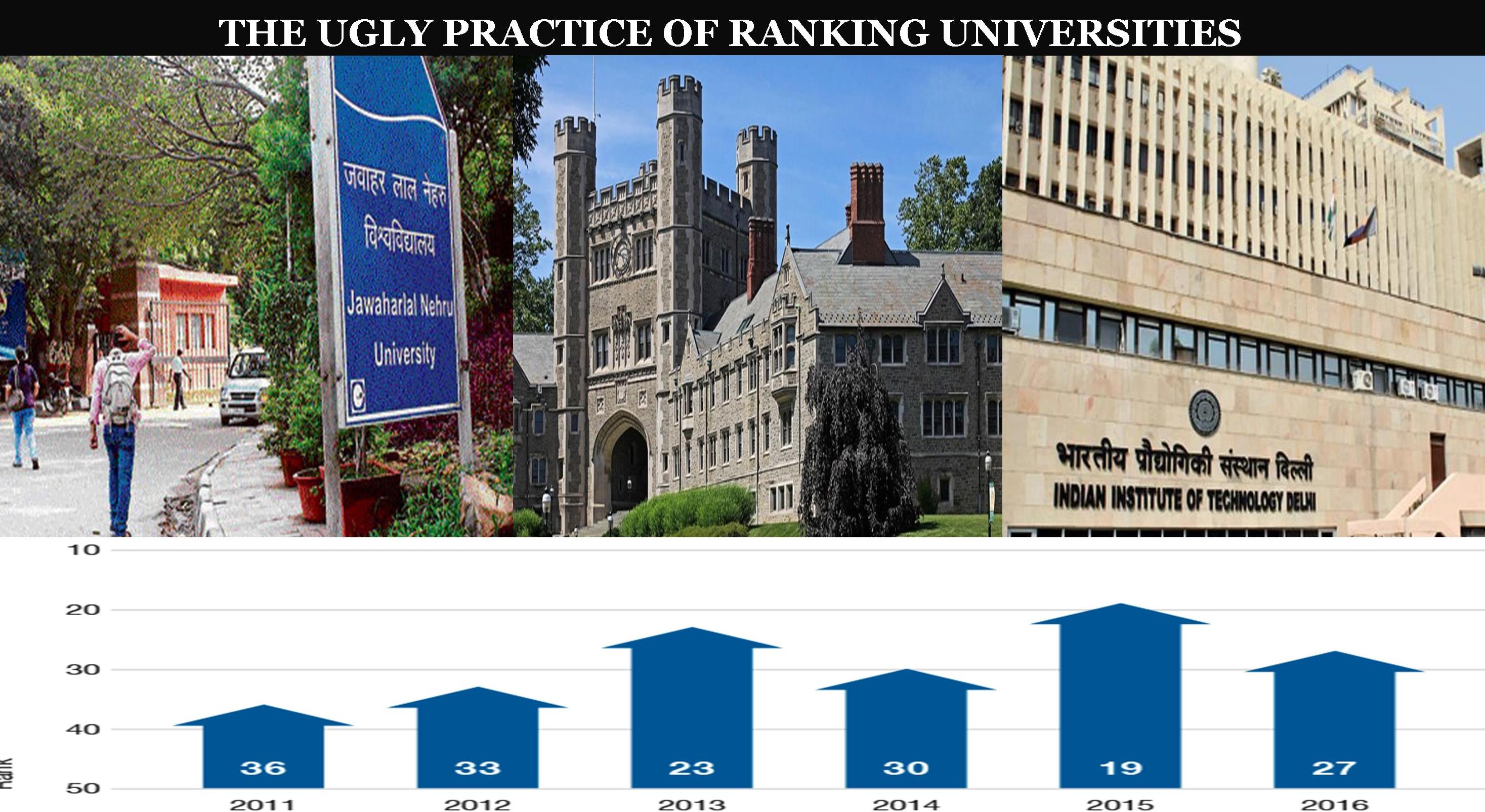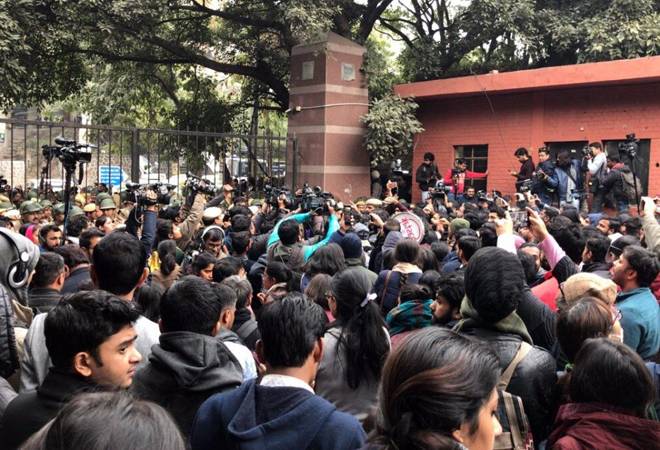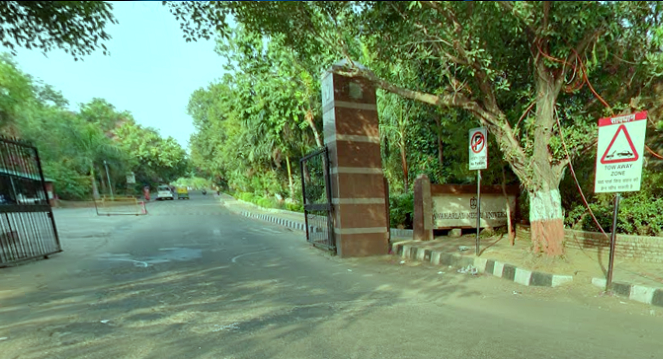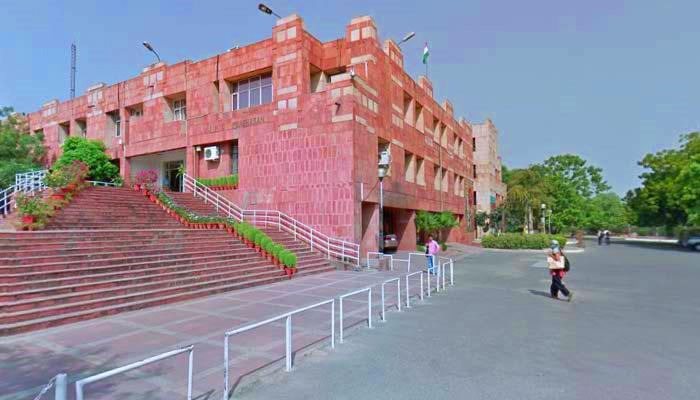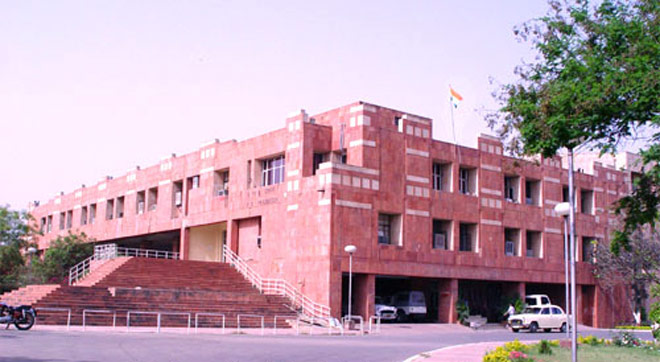These days colleges/ universities are ranked frequently. We take it for granted; we tend to believe that it is good for retaining the quality of higher education. However, in this article, the author who is teaching at Jawaharlal Nehru University gives counter-arguments, and wants us to see the ugly consequences of the culture of ranking educational institutions.
Prof. Avijit Pathak teaches at the Centre for the Study of Social Systems, Jawaharlal Nehru University, New Delhi.
Utopias are sweet dreams, wrote Kant, but to strive relentlessly towards them is the duty of the citizen and of the statesmen as well. Universities stand for these ideal causes which can never be lost so long as men seek wisdom and follow righteousness. – S.Radhakrishnan
I belong to the university system. I teach; I engage with young research scholars; I strive for a synthesis of vibrant teaching and meaningful research; and I try my best to create a culture of learning that is participatory, inclusive and life sustaining. When my friends and relatives say that ours is a good university, it fills my mind with joy; and it makes me humble and aware of the significance of my vocation. Yet, I dislike the practice of ranking colleges and universities. I know that we live in a highly competitive age that believes in measuring and hierarchizing every aspect of life; I am aware that it is widely believed that the urge to be at the ‘top’ is the driving force for a university or its faculty to work hard and excel. I know that many Indian universities have been reduced into factories for conducting examinations and distributing degrees and diplomas, and there is nothing to defend. Under these circumstances when social Darwinism is the cherished mantra of the aspiring middle class, if you are against ranking, you are likely to be seen as a romantic idealist, a dreamer, or a non-ambitious fool without vitality and pride. Yet, I question this practice of ranking and hierarchizing educational institutions. In order to make my point clear I would put forward two reasons—philosophical as well as practical.

Ranking is hierarchical; ranking degrades the soul of an institution
When I say that I am against ranking, I do not mean that there is no scope for one to improve and learn from others. Instead, I am pleading for differences, uniqueness, and constant growth and evolution through mutual learning, exchange of experiences and fusion of horizons. Every university, I believe, is unique; its historicity and its socially embedded educational objectives and priorities cannot be evaluated and measured through a decontextualized/ standardized/uniform scale. In fact, diversities enrich the world. Can you say that science is better than poetry? Is it right to proclaim that cricket is superior to football? Or is it a good idea to compare Albert Camus with Munshi Premchand? It is not. Likewise, can you compare the objectives with which Tagore started his Shantiniketan with the nation-making project of techno-scientific development that guided Nehru to open the IITs? Think of it. And I am sure you would agree that if everything is measured through the same scale, it kills the soul of a phenomenon. Imagine you being compared with others and ranked as the worst (or even best) father or sister in the world! If you are sensitive and confident of your own rhythm, you would protest because from deep inside you know that you are what you are, you are neither ‘best’ nor ‘worst’, and the spirit of your being is your fragrance, and it is not for sale and measurement. Hierarchy degrades us, kills our uniqueness and swadharma. It is for this reason that I would keep insisting that Harvard, for instance, cannot be compared with JNU; or Shantiniketan cannot be compared with the IIT. Take, for instance, the mission of JNU—the socio-political objectives for which it was visualized and created. The cultivation of humanities and social sciences, and the attempt to promote heterogeneity and encourage students from marginalized and deprived sections of society—these were the primary goals of JNU. Think of a situation: A student from the hinterland of Chattisgarh comes to JNU, learns from its vibrant culture of debate and discussion, and joins a local college as a faculty, and says : “ For me, JNU is the best thing that has happened in my life; it has altered me.’ This experience has its own soul, own significance; it cannot be compared with the publications of a Harvard professor. Yes, the Harvard professor is doing a remarkable job in his own context; and a JNU classroom is doing a wonderful job, even if the JNU professor keeps engaging with all these students, instead of getting a Nobel Prize. Why should we compare and hierarchize? Or think of a teacher of fine arts at Shantiniketan; her task is qualitatively different from that of a professor of computer engineering in the IIT. An artist, despite his brilliance, may not immediately get a job; whereas a pampered technocrat invites ‘recruitment cells’ in the IIT campus. Should it be the reason to say that the IIT is superior to Shantiniketan? It is absurd. Every institution is unique; and the moment we begin to compare and rank we do a great damage to the natural flow of an institution. We introduce envy, imitative tendencies and a sense of perpetual insecurity. This promotes dull standardization. For instance, BHU could have emerged as a great centre for Indology and civilizational studies; but then, you introduce everything—from bio medicine to management; and make it like any other university without its distinctiveness. Likewise, you need engineering and management in JNU, and try to kill its specific identity. It is sad that because of this comparison and resultant insecurity we often strive for the ‘top’ universities in the ‘first ‘world. The other day I asked a student of mine: Have you ever seen a professor of Harvard or Oxford on sabbatical joining JNU or Jadavpur? She remained silent. Yes, in her silence I found the answer. They do not come; we are mad for going there because we have lost faith in our own mission, in our uniqueness. We seem to have forgotten the truth: a rose is a rose, a lotus is a lotus, and nature is beautiful and rhythmic because of these diverse manifestations of creation. Don’t think that I am pleading for stagnation or absolute relativism. As I have already said, I am for constant dialogue, exchange of experiences and mutual learning and elevation. Hence, the universities all over the world should learn from one another without forgetting their uniqueness and specific historic missions. This collective learning is one thing; and the culture of ranking and hierarchization is quite another.
Ranking is ornamental packaging; ranking is corruption
There is also a practical reason for my opposition to the practice of ranking. As an insider, I know that it corrupts; it diverts our attention from the real task of teaching/learning to the manipulative technique of packaging and displaying. All that is beautiful is qualitative—beyond measurement. A good lecture, an innovative pedagogic practice, the spark of originality in a young scholar’s research proposal, a good book a professor writes in his whole life—these are great experiences which cannot be quantified. However, the authorities who insist on ranking are eager to see only what is measurable. You cannot measure a professor’s honesty, creativity and wisdom. But you can count and measure the publication list, seminars/conferences, range of departments, teacher-taught ratio, the infrastructure and budget allocation, the citation index, the employability of students, the projects that fetch money, awards and prizes. Hence, these days every college/university is spending considerable amount of time and energy for impressing the authorities (I doubt whether they are true educators) through their projected performance in terms of the measured scale. If we see our own country known for its widespread corruption network, we see its devastating consequences. The growth of publication industry (pay and publish), the recurrence of useless seminars and international conferences, the restlessness for acquiring a project, and the packaging of an educational institution like a marketable product (I often see the advertisement of a private university, and its loud declaration that it is India’s Number 1 university)—these ugly practices indicate how everything has become upside down. Yes, seminars are held; edited volumes are published; experts keep ‘measuring’ the talent of a young faculty; and colleges/universities are graded/ranked. However, if you are honest and sensitive, you realize its hollowness, its pretentious character. When the outer visibility and shiny medals become more important than inner beauty, corruption becomes inevitable. Don’t forget that everything that is beautiful and substantial need not necessarily get a prize. Mohandas Karamchand Gandhi did not get the Nobel Peace Prize; Richard Nixon—the notorious American President— got it. A silent researcher’s great work, a dedicated teacher’s remarkable contribution, a student’s creativity and ability to contribute meaningfully to the making of a good society—nothing matters. The only thing that matters is how attractively you package and sell yourself. This is business; this is not education.

No ranking; towards inner growth
Skills develop; policies are shaped; techniques are refined; but wisdom as a form of deep reflection, collective exchange, and a recognition and even a critique of inner values is put in jeopardy.
-Ronald Barnett
My critique of this sort of ranking, as I have already indicated, does by no means imply that I do not want our universities to evolve and improve. In fact, when there is no fear, no dishonesty, no imitation, real improvement takes place. In this context, I wish to suggest a set of measures. First, our universities—not just ours, even supposedly ‘top’ Euro-American universities—need to rethink the very purpose of education and knowledge production. Think of it. You have Harvard and MIT, Cambridge and Princeton. Yet, the world is not free from war, technological violence, inequality, corruption and all-pervading meaninglessness. And many products from these ‘top’ universities work in the sectors –transnational corporations, defence research laboratories, gigantic media houses and culture /entertainment industry– that engage in these manipulative exercises. What, then, is the meaning of the endless flow of publications, theses, research grants and academic achievements? Is it that universities are making us clever and ‘smart’, but not necessarily wise and humane? I strongly believe that we have to restore wisdom, spiritual wonder, poetic feeling, love and care in the pursuit of knowledge: science connected with deep ethical principles and civilizational values; technology in harmony with the rhythm of life and nature; music, literature and humanities as liberating experiences. If knowledge production is governed by purely instrumental rationality, and a professor, despite all fancy publications and prizes, fails to arouse love and positive vibrations amongst his students and the members of the larger society, his ‘excellence, for me, has no meaning. Second, and particularly in the context of India, we need to create a truly spirited culture of learning. It is possible only when we fight the ugly practices of corruption and nepotism in the appointment of teachers. Good teachers who love the vocation, aspire for a just society, and realize that the only power that matters is that of love and wisdom can heal our wounded campuses. It is sad that we create universities because of political patronage; but seldom do we take care of the physical and cultural environment (I mean good libraries, vice-chancellors who are honest educators, not sycophants of the ruling establishment, motivated teachers, eager students, social/ethical sensibilities, and creative pedagogy not limited to examinations and degrees). We need to learn the value of life-affirming education.
When the true spirit of learning is nurtured, we grow from within. No ranking/grading is needed. I want my readers to think of this possibility, this feasible utopia we ought to strive for.
The New Leam has no external source of funding. For retaining its uniqueness, its high quality, its distinctive philosophy we wish to reduce the degree of dependence on corporate funding. We believe that if individuals like you come forward and SUPPORT THIS ENDEAVOR can make the magazine self-reliant in a very innovative way.

